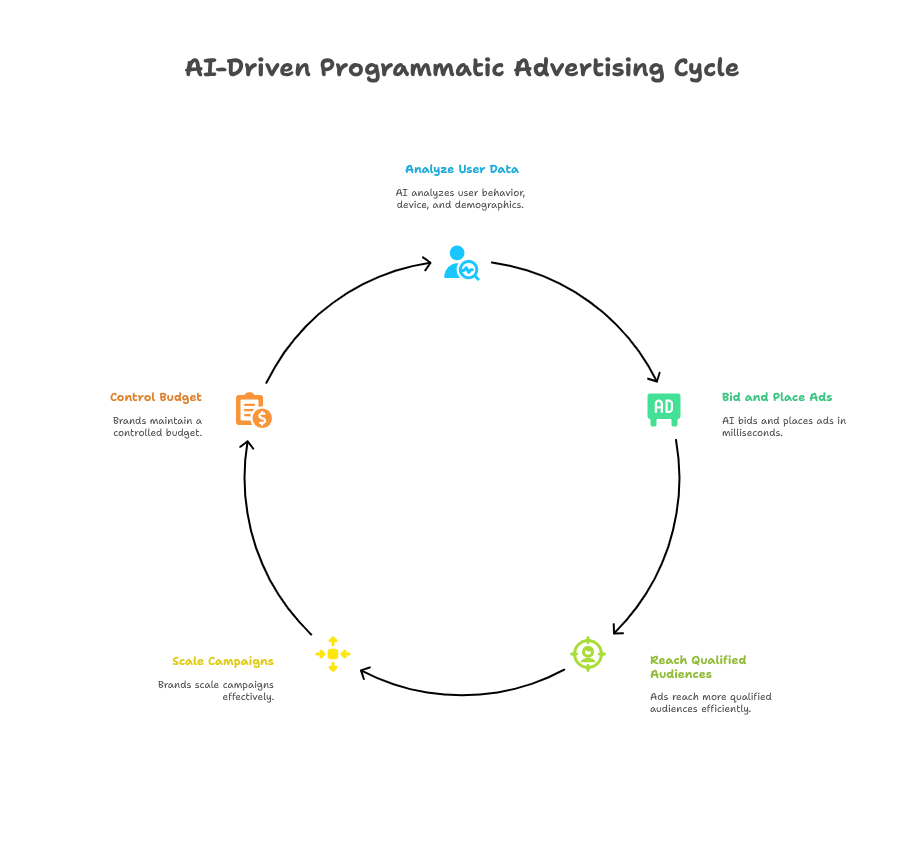In 2025, AI-powered advertising is redefining how businesses approach digital marketing. By harnessing artificial intelligence and machine learning, companies are boosting ad performance, reducing wasted budget, and achieving a significantly better return on investment (ROI). From smarter ad targeting to automated optimization, AI is now essential for data-driven marketing strategies.
Smarter Targeting with Predictive AI Tools
One of the biggest advantages of AI in advertising is predictive targeting. AI algorithms analyze user behavior, preferences, and search intent to deliver personalized ads that truly resonate. Instead of generic campaigns, businesses in 2025 are running AI-driven ads that reach high-intent users—resulting in higher engagement rates and lower cost-per-click (CPC).
Real-Time Optimization for Maximum ROI
AI tools like Google Performance Max and Meta Advantage+ enable real-time ad optimization. These platforms automatically adjust bidding, audience segments, and creatives based on live performance. This helps marketers make data-backed decisions quickly—driving better results and higher return on ad spend (ROAS).
Hyper-Personalized Content Across Channels
AI allows advertisers to create hyper-personalized ad content across Google Ads, Facebook, Instagram, and more. Dynamic creative tools adapt messaging based on demographics, user actions, or location, ensuring better ad relevance. Personalization powered by AI leads to higher conversion rates and stronger brand loyalty.
Faster Creative Production with AI Ad Tools
Tools like ChatGPT, Jasper AI, and Canva AI are helping businesses create ad copy, video scripts, and banners in minutes. These AI ad creative tools save time and cost while maintaining consistency and effectiveness. In 2025, using generative AI for content production is a key advantage for agile marketing teams.
Better ROI Tracking with AI Analytics
AI-powered analytics platforms now offer automated performance tracking, visual reports, and ROI forecasting. This helps businesses measure the effectiveness of every campaign and make smarter decisions. From attribution models to budget recommendations, AI takes the guesswork out of advertising analytics.
AI Chatbots and Conversational Ads for Lead Generation
AI-powered chatbots and conversational ads are becoming vital for lead generation in 2025. Platforms like WhatsApp Business, Messenger, and websites now use intelligent bots to initiate ad-based conversations, qualify leads, and even close sales. These bots offer real-time assistance, increasing customer satisfaction and reducing friction in the buyer journey—ultimately improving ROI.
AI in Programmatic Advertising

In 2025, programmatic AI-Powered Advertising is almost entirely driven by AI. Platforms like Google Display Network and DV360 use AI to buy and place ads in milliseconds based on user behavior, device, and demographics. With automated bidding and placement, brands can scale campaigns efficiently and reach more qualified audiences while maintaining a controlled budget.
Voice and Visual Search Advertising with AI
AI is also shaping the future of voice search and AI-powered advertising. With more consumers using smart speakers and image-based queries, marketers must optimize their ad content for voice assistants (like Alexa and Google Assistant) and platforms like Google Lens and Pinterest. AI helps identify voice intent and visual context to deliver relevant ads.
Predictive Budget Allocation and Campaign Planning
AI doesn’t just improve campaigns—it helps plan them better. With predictive analytics, marketers can forecast which ad sets, keywords, and audiences will perform best. AI platforms now suggest budget splits, optimal times to run ads, and channels with the best ROI based on historical and real-time data.
Ethical Use of AI in Advertising
As AI becomes more integral to digital advertising, ethical AI usage is also a rising concern. Responsible marketers must ensure data transparency, user privacy, and compliance with regulations like GDPR and AI Act (EU). Using AI responsibly helps build trust and avoids ad fatigue or misaligned personalization.
Bonus Tip: How to Start Using AI Ads (Even on a Budget)
Even small businesses can start leveraging AI in 2025. Tools like Meta Ads Manager, Google Smart Campaigns, AdCreative.ai, and Surfer SEO offer beginner-friendly AI features to create, test, and optimize ads without expert-level skills. Start small, track ROI, and scale with what works best.
FAQs: AI-Powered Advertising in 2025
Q1. What is AI-powered advertising?
A: AI-powered advertising uses artificial intelligence to automate, optimize, and personalize digital ads. In 2025, AI helps marketers target the right audience, adjust ad performance in real time, and generate creative content for better ROI.
Q2. How does AI improve ad ROI in 2025?
A: AI boosts ROI by analyzing data to predict which ads perform best, adjusting bids automatically, creating tailored ad content, and targeting high-intent users—reducing wasted ad spend and increasing conversions.
Q3. Which AI tools help improve digital advertising?
A: Top AI tools in 2025 include Google Performance Max, Meta Advantage+, AdCreative.ai, Jasper AI, Smartly.io, and Surfer SEO. These tools help automate targeting, generate creatives, and track ROI effectively.
Q4. Can small businesses use AI-Powered Advertising tools?
A: Yes! Many AI advertising tools are beginner-friendly and offer budget plans for startups and small businesses. Platforms like Google Ads and Meta offer built-in AI features that are easy to use with minimal experience.
Q5. Is AI better than manual ad management?
A: AI doesn’t replace humans—it enhances campaigns with speed and data-driven precision. In 2025, combining AI tools with human strategy offers the best results for ad performance and ROI.
Q6. What types of ads can AI optimize?
A: AI can optimize search ads, display ads, social media ads, video ads, retargeting campaigns, and even email marketing creatives—making it a versatile solution across all digital channels.
Q7. Is AI-Powered Advertising ethical and safe?
A: Responsible AI advertising complies with data privacy laws like GDPR and uses transparent targeting practices. Marketers should choose ethical AI tools that prioritize user consent and fairness.

